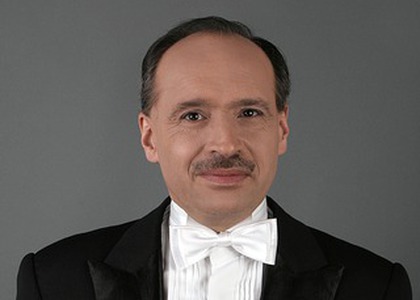> [Archived] Interviews

Interview with Iosif Ion Pruner, president of the Silvestri Foundation
On the 31st of May we celebrate 110 years since the birth of conductor and composer Constantin Silvestri. The series of events organised for this occasion includes three recitals in between the 24th of May and the 15th of June 2023, under the name of The Constantin Silvestri Days.
Through The Silvestri Foundation, you propose a series of events celebrating 110 years since the birth of Constantin Silvestri. This series began in January with a recital at the Romanian Embassy in Berlin, celebrating Culture Day and continues on the 24th of May with a recital from piano player Elisabeth Leonskaja. How did she respond to your invitation? And how is her name tied to Constantin Slivestri?
There are two explanations. Elisabeth Leonskaja is the winner of the George Enescu competition-1964, after Silvestri became part of the jury of the first piano competition. He was the president of the jury of the piano competition, and in 1964 Elisabeth Leonskaja won this prize. That would be the first link. Of course, Silvestri is also tied to the first edition of Oedipe and so on, but he is the only conductor, apart from Celibidache, who lived in Romania, who was in Romania and who had recordings with all the great orchestras of London, Paris, with the greatest European orchestras and there are few people who know that. And she is a pianist of that level, she is the contact with the great orchestras and stages. And I think, a great name should be celebrated by another great name. Being tied to Romania for a long time as well, Elisabetha Leonskaja happily accepted the invitation to open the Silvestri Days that our foundation is organising. There will be many concerts between the 24th of May and the 15th of June.
Like you just said, there will be other concerts as part of this series as well, on the 12th and 15th of June, The Constantin Silvestri Days. Can you please give us more details?
On the 12th of June, there will be a special concert. You might wonder if Silvestri had any connection to jazz. He does. Because Silvestri was open to all kinds of music. For those who don't know much about him, he was a great piano player, then an equally great piano improviser, not necessarily of jazz, I know he really liked jazz- I say this as his nephew as well-but he received themes of improvisation, and he did classical improvisation, he would do a Bach fugue, then he would do a short form of sonata with themes he would receive from the public in the middle of the 40's, at Sala Dalles. So this type of improvisation specific to jazz and to classical music was very dear to Silvestri. Moreover, I proposed to master Tiberian to use themes from Silvestri's work, namely the Transylvanian Dances, and he agreed.
And the event on the 15th of June?
We'll continue in the same way, because Silvestri was very attached to the beginnings of the Enescu Festival and the Enescu Competition. On the 15th of June, we have invited another prize winner, not necessarily a piano one, but a winner of the Enescu Competition, who is now on the rise, Valentin Serban, who will interpret a piece from a composer very dear to Silvestri, Cesar Franck. He will play a sonata for piano and violin. You will find this symphony by Frank in many versions of the big orchestras, to which we add Shostakovich, who was one of Silvestri's favourite composers. I will play alongside one of our very important artists. She is less present in Romania, but few know that Miss Gabriela Istoc played in Oedipe in London, where I've participated as well together with our choir and Jurowski and we've invited her to play alongside Silvestri and Shostakovich. Going back to Shostakovich, there is a motto on our flyer: "so much wisdom, so much talent…we must do everything possible to keep their memories alive"-it was Dmitri Shostakovich who spoke when Silvestri died in 1969.
The three concerts will be accompanied by a multimedia exposition. What can you tell us about it?
It's another format of slydes, presenting moments of Silvestri's life, his concerts, his chronicles, the relationships he had in the context of his international career, and, of course, of his beginnings here, of his ties to our great musicians, like Jora and Perlea.
Are you planning to continue this series of events dedicated to Constantin Silvestri throughout the year?
Definitely, throughout the year and further than that, we have some projects that we want to develop here together with all the important institutions, the Opera, the Philharmonic, but we also want to institutionalise some of our activities abroad, in the great European cities, like Berlin and Paris.
Translated by Ioana Busuioc,
University of Bucharest, Faculty of Foreign Languages and Literatures, MTTLC, year II
Corrected by Silvia Petrescu














